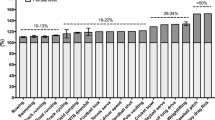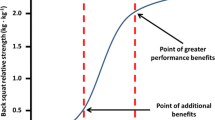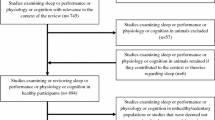Abstract
Introduction
Ironman triathletes undergo high workloads during competition preparation which can result in nonfunctional overreaching or overtraining syndrome if not matched with adequate recovery.
Purpose
The purpose of this case study was to observe changes in physiological and psychological status over the course of a competitive season in a free-living triathlete.
Methods
The subject was a 41-year-old triathlete competing in three 113.1-km events. Over the course of a 40-week period, the participant arrived at the laboratory every 4 weeks and underwent body composition testing via air displacement plethysmography, a blood draw for analysis of various biomarkers, and a treadmill-based lactate threshold test. Workload during training and competitions was monitored via a wearable heart rate-monitoring device.
Results
Throughout the season, training volume remained high (12.5 ± 3.4 h/week) and body mass and fat-free mass (FFM) continuously decreased, while biomarkers including cortisol, testosterone, and markers of immunological status exhibited minor changes. Laboratory performance remained relatively consistent, while competition performance continually improved. Following the completion of the competitive period, training volume decreased, FFM remained below baseline levels, free cortisol increased, and both free and total testosterone decreased.
Conclusions
Workload and recovery seem to have been properly managed throughout the season, evidenced by minimal fluctuations in endocrine and immunological markers. The reason for changes observed in testosterone, cortisol, and body composition following the last competition is unclear, though it may be attributed to changes in stressors and recovery practices outside of training. It is recommended that athletes follow a structured plan during the transition period into the offseason to ensure recovery of physiological state and to set up a productive offseason.



Similar content being viewed by others
Data availability
The datasets generated during and analyzed in the current study are available from the corresponding author upon reasonable request.
Abbreviations
- %BF:
-
Body fat percentage
- %Sat:
-
Percent saturation
- BM:
-
Body mass
- CBC:
-
Complete blood count
- CK:
-
Creatine kinase
- CMP:
-
Comprehensive metabolic panel
- CRP:
-
C-reactive protein
- DHA:
-
Docosahexaenoic acid
- EEE:
-
Exercise energy expenditure
- EPA:
-
Eicosapentaenoic acid
- FFM:
-
Fat-free mass
- GH:
-
Growth hormone
- GXT:
-
Graded exercise test
- HPA:
-
Hypothalamic–pituitary–adrenal
- HPG:
-
Hypothalamic–pituitary–gonadal
- HR:
-
Heart rate
- IBC:
-
Iron-binding capacity
- IgA:
-
Immunoglobulin A
- IGF-1:
-
Insulin-like growth factor-1
- IL-6:
-
Interleukin-6
- LDH:
-
Lactate dehydrogenase
- LT:
-
Lactate threshold
- MTDS:
-
Multicomponent Training Distress Scale
- NFOR:
-
Nonfunctional overreaching
- OTS:
-
Overtraining syndrome
- PSQI:
-
Pittsburgh Sleep Quality Index
- SHBG:
-
Sex hormone-binding globulin
- T3:
-
Triiodothyronine
- T4:
-
Thyroxine
- TSH:
-
Thyroid-stimulating hormone
References
Armstrong LE, VanHeest JL (2002) The unknown mechanism of the overtraining syndrome: clues from depression and psychoneuroimmunology. Sports Med 32(3):185–209. https://doi.org/10.2165/00007256-200232030-00003
Aubry A, Hausswirth C, Louis J, Coutts AJ, Meur YLE (2014) Functional overreaching: the key to peak performance during the taper? Med Sci Sports Exerc 46(9):1769–1777. https://doi.org/10.1249/MSS.0000000000000301
Banfi G, Marinelli M, Roi GS, Agape V (1993) Usefulness of free testosterone/cortisol ratio during a season of elite speed skating athletes. Int J Sports Med 14(7):373–379. https://doi.org/10.1055/s-2007-1021195
Beagley KW, Eldridge JH, Lee F, Kiyono H, Everson MP, Koopman WJ, Hirano T, Kishimoto T, McGhee JR (1989) Interleukins and IgA synthesis. Human and murine interleukin 6 induce high rate IgA secretion in IgA-committed B cells. J Exp Med 169(6):2133–2148. https://doi.org/10.1084/jem.169.6.2133
Beattie K, Kenny IC, Lyons M, Carson BP (2014) The effect of strength training on performance in endurance athletes. Sports Med 44(6):845–865. https://doi.org/10.1007/s40279-014-0157-y
Berger BG, Motl RW, Butki BD, Martin DT, Wilkinson JG, Owen DR (1999) Mood and cycling performance in response to three weeks of high-intensity, short-duration overtraining, and a two-week taper. Sport Psychol 13(4):444–457. https://doi.org/10.1123/tsp.13.4.444
Bosquet L, Léger L, Legros P (2001) Blood lactate response to overtraining in male endurance athletes. Eur J Appl Physiol 84(1–2):107–114. https://doi.org/10.1007/s004210000343
Buysse DJ, Reynolds CF, Monk TH, Berman SR, Kupfer DJ (1989) The Pittsburgh sleep quality index: a new instrument for psychiatric practice and research. Psychiatry Res 28(2):193–213. https://doi.org/10.1016/0165-1781(89)90047-4
Cadegiani FA, Kater CE (2017) Hormonal aspects of overtraining syndrome: a systematic review. BMC Sports Sci Med Rehabil 9:14. https://doi.org/10.1186/s13102-017-0079-8
Cheng B, Kuipers H, Snyder AC, Keizer HA, Jeukendrup A, Hesselink M (1992) A new approach for the determination of ventilatory and lactate thresholds. Int J Sports Med 13(7):518–522. https://doi.org/10.1055/s-2007-1021309
De Souza MJ, Nattiv A, Joy E, Misra M, Williams NI, Mallinson RJ, Gibbs JC, Olmsted M, Goolsby M, Matheson G (2014) 2014 Female Athlete Triad Coalition consensus statement on treatment and return to play of the female athlete triad. Br J Sports Med 48(4):289. https://doi.org/10.1136/bjsports-2013-093218
Dempster P, Aitkens S (1995) Evaluation of a new air displacement of human body composition. Med Sci Sports Exerc 27(12):1692–1697
DiNicolantonio JJ, O’Keefe JH (2018) Importance of maintaining a low omega-6/omega-3 ratio for reducing inflammation. Open Heart 5(2):e000946. https://doi.org/10.1136/openhrt-2018-000946
Fallon KE (2008) The clinical utility of screening of biochemical parameters in elite athletes: analysis of 100 cases. Br J Sports Med 42(5):334–337. https://doi.org/10.1136/bjsm.2007.041137
Fry RW, Grove JR, Morton AR, Zeroni PM, Gaudieri S, Keast D (1994) Psychological and immunological correlates of acute overtraining. Br J Sports Med 28(4):241–246. https://doi.org/10.1136/bjsm.28.4.241
Gleeson M (2002) Biochemical and immunological markers of overtraining. J Sports Sci Med 1:31–41
Hackney AC (1991) Hormonal changes at rest in overtrained endurance athletes. Biol Sport 8(2):49–55
Halson SL, Jeukendrup AE (2004) Does overtraining exist? An analysis of overreaching and overtraining research. Sports Med 34(14):967–981. https://doi.org/10.2165/00007256-200434140-00003
Halson SL, Bridge MW, Meeusen R, Busschaert B, Gleeson M, Jones DA, Jeukendrup AE (2002) Time course of performance changes and fatigue markers during intensified training in trained cyclists. J Appl Physio (1985) 93(3):947–956. https://doi.org/10.1152/japplphysiol.01164.2001
Hansen KN, Bjerre-Knudsen J, Brodthagen U, Jordal R, Paulev PE (1982) Muscle cell leakage due to long distance training. Eur J Appl Physiol Occup Physiol 48(2):177–188. https://doi.org/10.1007/BF00422979
Keast D, Cameron K, Morton AR (1988) Exercise and the immune response. Sports Med 5(4):248–267. https://doi.org/10.2165/00007256-198805040-00004
Keytel LR, Goedecke JH, Noakes TD, Hiiloskorpi H, Laukkanen R, van der Merwe L, Lambert EV (2005) Prediction of energy expenditure from heart rate monitoring during submaximal exercise. J Sports Sci 23(3):289–297. https://doi.org/10.1080/02640410470001730089
Khlif R, Marrakchi R, Jamoussi K, Sahnoun Z, Chtourou H, Souissi N (2019) Plasma iron status in elite weightlifters after four weeks of intensive training. Sci Sports 34(5):328.e321–328.e328. https://doi.org/10.1016/j.scispo.2019.02.003
Kraemer WJ, French DN, Paxton NJ, Hakkinen K, Volek JS, Sebastianelli WJ, Putukian M, Newton RU, Rubin MR, Gomez AL, Vescovi JD, Ratamess NA, Fleck SJ, Lynch JM, Knuttgen HG (2004) Changes in exercise performance and hormonal concentrations over a big ten soccer season in starters and nonstarters. J Strength Cond Res 18(1):121–128
Kreher JB, Schwartz JB (2012) Overtraining syndrome: a practical guide. Sports Health 4(2):128–138. https://doi.org/10.1177/1941738111434406
Lastella M, Vincent GE, Duffield R, Roach GD, Halson SL, Heales LJ, Sargent C (2018) Can sleep be used as an indicator of overreaching and overtraining in athletes? Front Physiol 9:436. https://doi.org/10.3389/fphys.2018.00436
Lee EC, Fragala MS, Kavouras SA, Queen RM, Pryor JL, Casa DJ (2017) Biomarkers in sports and exercise: tracking health, performance, and recovery in athletes. J Strength Cond Res 31(10):2920–2937. https://doi.org/10.1519/JSC.0000000000002122
Logue D, Madigan SM, Delahunt E, Heinen M, Mc Donnell SJ, Corish CA (2018) Low energy availability in athletes: a review of prevalence, dietary patterns, physiological health, and sports performance. Sports Med 48(1):73–96. https://doi.org/10.1007/s40279-017-0790-3
MacKinnon LT (2000) Overtraining effects on immunity and performance in athletes. Immunol Cell Biol 78(5):502–509. https://doi.org/10.1111/j.1440-1711.2000.t01-7-.x
Main L, Grove JR (2009) A multi-component assessment model for monitoring training distress among athletes. Eur J Sport Sci 9(4):195–202. https://doi.org/10.1080/17461390902818260
Maso F, Lac G, Filaire E, Michaux O, Robert A (2004) Salivary testosterone and cortisol in rugby players: correlation with psychological overtraining items. Br J Sports Med 38(3):260–263. https://doi.org/10.1136/bjsm.2002.000254
McFadden BA, Walker AJ, Bozzini BN, Hofacker M, Russell M, Arent SM (2022) Psychological and physiological changes in response to the cumulative demands of a women’s division I collegiate soccer season. J Strength Cond Res 36(5):1373–1382. https://doi.org/10.1519/JSC.0000000000004062
Meeusen R, Duclos M, Foster C, Fry A, Gleeson M, Nieman D, Raglin J, Rietjens G, Steinacker J, Urhausen A, European College of Sport Science, American College of Sports Medicine (2013) Prevention, diagnosis, and treatment of the overtraining syndrome: joint consensus statement of the European College of Sport Science and the American College of Sports Medicine. Med Sci Sports Exerc 45(1):186–205. https://doi.org/10.1249/MSS.0b013e318279a10a
Millet GP, Dreano P, Bentley DJ (2003) Physiological characteristics of elite short- and long-distance triathletes. Eur J Appl Physiol 88(4–5):427–430. https://doi.org/10.1007/s00421-002-0731-0
Mountjoy M, Sundgot-Borgen J, Burke L, Ackerman KE, Blauwet C, Constantini N, Lebrun C, Lundy B, Melin A, Meyer N, Sherman R, Tenforde AS, Torstveit MK, Budgett R (2018) International Olympic Committee (IOC) consensus statement on relative energy deficiency in sport (RED-S): 2018 update. Int J Sport Nutr Exerc Metab 28(4):316–331. https://doi.org/10.1123/ijsnem.2018-0136
Neal CM, Hunter AM, Galloway SD (2011) A 6-month analysis of training-intensity distribution and physiological adaptation in Ironman triathletes. J Sports Sci 29(14):1515–1523. https://doi.org/10.1080/02640414.2011.596217
Nicoll JX, Hatfield DL, Melanson KJ, Nasin CS (2018) Thyroid hormones and commonly cited symptoms of overtraining in collegiate female endurance runners. Eur J Appl Physiol 118(1):65–73. https://doi.org/10.1007/s00421-017-3723-9
Nieman DC, Austin MD, Dew D, Utter AC (2013) Validity of COSMED’s quark CPET mixing chamber system in evaluating energy metabolism during aerobic exercise in healthy male adults. Res Sports Med 21(2):136–145. https://doi.org/10.1080/15438627.2012.757227
O’Toole ML (1989) Training for ultraendurance triathlon. Med Sci Sports Exerc 65(9):S209–S213
O’Toole ML, Douglas PS (1995) Applied physiology of triathlon. Sports Med 19(4):251–267. https://doi.org/10.2165/00007256-199519040-00003
O’Toole ML, Hiller WD, Smith RA, Sisk TD (1989) Overuse injuries in ultraendurance triathletes. Am J Sports Med 17(4):514–518. https://doi.org/10.1177/036354658901700411
Roberts AC, McClure RD, Weiner RI, Brooks GA (1993) Overtraining affects male reproductive status. Fertil Steril 60(4):686–692
Selles-Perez S, Fernandez-Saez J, Ferriz-Valero A, Esteve-Lanao J, Cejuela R (2019) Changes in triathletes’ performance and body composition during a specific training period for a half-ironman race. J Hum Kinet 67:185–198. https://doi.org/10.2478/hukin-2018-0077
Smith LL (2000) Cytokine hypothesis of overtraining: a physiological adaptation to excessive stress? Med Sci Sports Exerc 32(2):317–331
Spiker AM, Dixit S, Cosgarea AJ (2012) Triathlon: running injuries. Sports Med Arthrosc Rev 20(4):206–213. https://doi.org/10.1097/JSA.0b013e31825ca79f
Urhausen A, Kindermann W (2002) Diagnosis of overtraining: what tools do we have? Sports Med 32(2):95–102. https://doi.org/10.2165/00007256-200232020-00002
Urhausen A, Gabriel H, Kindermann W (1995) Blood hormones as markers of training stress and overtraining. Sports Med 20(4):251–276. https://doi.org/10.2165/00007256-199520040-00004
Viau V (2002) Functional cross-talk between the hypothalamic-pituitary-gonadal and -adrenal axes. J Neuroendocrinol 14(6):506–513. https://doi.org/10.1046/j.1365-2826.2002.00798.x
Walker AJ, McFadden BA, Sanders DJ, Rabideau MM, Hofacker ML, Arent SM (2019) Biomarker response to a competitive season in Division I female soccer players. J Strength Cond Res 33(10):2622–2628. https://doi.org/10.1519/JSC.0000000000003264
Willis KS, Smith DT, Broughton KS, Larson-Meyer DE (2012) Vitamin D status and biomarkers of inflammation in runners. Open Access J Sports Med 3:35–42. https://doi.org/10.2147/OAJSM.S31022
Funding
This study was funded by Quest Diagnostics.
Author information
Authors and Affiliations
Contributions
AJW and SMA conceived the idea and designed the study. HPC, MLB, AJW, AJC, and BAM performed data collection. HPC performed data analysis and prepared the manuscript. All authors reviewed data analysis and interpretations, revised the manuscript, and read and approved the final manuscript.
Corresponding author
Ethics declarations
Conflict of interest
The authors declare no conflicts of interest.
Ethics approval
All procedures and protocols performed in this study were approved by the Rutgers University Institutional Review Board in accordance with the 1964 Declaration of Helsinki and its later amendments. The research participant provided written informed consent upon enrollment in the study.
Additional information
Communicated by Michael I Lindinger.
Publisher's Note
Springer Nature remains neutral with regard to jurisdictional claims in published maps and institutional affiliations.
Rights and permissions
Springer Nature or its licensor (e.g. a society or other partner) holds exclusive rights to this article under a publishing agreement with the author(s) or other rightsholder(s); author self-archiving of the accepted manuscript version of this article is solely governed by the terms of such publishing agreement and applicable law.
About this article
Cite this article
Cintineo, H.P., Bello, M.L., Walker, A.J. et al. Monitoring training, performance, biomarkers, and psychological state throughout a competitive season: a case study of a triathlete. Eur J Appl Physiol (2024). https://doi.org/10.1007/s00421-023-05414-x
Received:
Accepted:
Published:
DOI: https://doi.org/10.1007/s00421-023-05414-x




